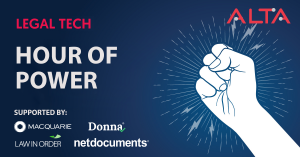Legal Tech Trends in the Asia-Pacific Region | Event Wrap-Up
Ben Fong wraps-up ALTA’s recent Legal Tech Trends in the Asia-Pacific webinar
As 2020 draws to a close, it is clear that the toll of COVID-19 on global health – both physical and economic – will not be missed. Governments have struggled to hold the line; once strong communities have been forced to their knees. And yet we find (incredibly) that the idea of ‘recovery’ is already being talked about in many parts of the world.
As recovery approaches, so too will the aftershocks. They will come in the form of structural changes to market demand, lasting well after 2020 has passed. Identifying and planning for these changes is a new priority for business owners – in legal tech and beyond.
Today’s webinar aims to start answering that question. Represented on the panel are legal tech vendors in Australia (Jodie Baker, ALTA); New Zealand (Ben Winslade, NZ Legal Tech); and ASEAN (Hanim Hamzah, ASEAN Legal Tech). Eric Chin (Alpha Creates) is moderator.
2020 demand
NZ Legal Tech’s Ben Winslade has seen winners and losers in the legal tech market this year. The winners? Vendors who haven’t tried to reinvent the wheel. Think products that intuitively replicate offline/low-tech processes without the need for complex, time-consuming training.
Running a business is a challenge in the good years. In a year like this, even the basics are a struggle. This hasn’t been lost on Winslade. Employees, client demands, and debts do not disappear in a pandemic. Is it any surprise that business leaders have been ‘very distracted’?
Winslade is blunt. This is not the year to ‘try to persuade people to think in a different way’.
ALTA’s Jodie Baker summarises the year in a word: ‘Acceleration’. She predicts a spike in demand for essential cloud-based IT infrastructure over the next 2-3 years. This is very good news for operational platforms like Xakia, which arguably fall into the must-have bucket.
Eric Chin and ASEAN Legal Tech’s Hanim Hamzah agree. Hamzah reflects on the importance of Microsoft 365 to her firm network, ZICO. It’s another reminder of the priorities that really matter to legal teams right now.
Wheels over leather seats; ‘must-have’ over ‘nice-to-have’.
Funding
Winslade’s evaluation is optimistic: ‘if anything, fundraising is easier now, as people are on the lookout for companies that are pitching something that is pandemic-proof’.
But he’s realistic about the odds for individual founders. If a legal tech business cannot provide strong underlying fundamentals, ‘(funding) will continue to be quite lean’.
Baker agrees with his take, recalling that ‘every company that’s ever shown an interest in Xakia rang like a vulture’ in the first half of 2020 – something she found ‘mildly amusing’.
But Baker has another, different prediction: a new phase of legal tech consolidation. After a few back to back years of strong demand and new market entrants, Baker thinks that there are enough competitors in the major pockets of the market for questions to be asked.
In Baker’s estimation – here, her experience as an equities and financial analyst is noticeable – these are precisely the conditions that lead to an acquisition rush. In other words, if several firms do similar things for similar clients, expect to see investors circling in for blood.
Hamzah agrees with Baker, pointing to the large amounts of ‘dry powder’ in ASEAN investor war chests. If a legal tech business can navigate the pandemic and point to a convincing growth story, Hamzah sees no shortage of ‘funds waiting to go to a good home’.
Chin wraps up by drawing a parallel between this talk of consolidation and the rise of several technology empires in the 1970s – Microsoft, HBO and Dell.
Gender diversity
The conversation flows into the topic of gender diversity. Chin notes that businesses with at least one female co-founder seem to have bigger teams (except for in Australia).
It seems clear that there is work to be done. Baker points to two factors as key obstacles to improved female participation in the legal tech sector; access to funding and access to time.
On the second point, Baker is direct. The ‘split of domestic labour is still a problem. Getting it (a business) off the ground can be a problem if you’re juggling too many balls.’
Hamzah agrees. ‘There is more to be done beyond legislation’ she says. For the start-up ecosystem to better reflect female talent and ability, Hamzah believes that there is a need for more mentoring and ‘women sponsoring women’ initiatives.
She sees a lack of that – even at her own firm. Candidly, she observes that ‘some women feel that they’ve got to where they are themselves’ and may balk at the idea of ‘a handicap’. But such objections fail to recognise the now-popular idea that behind many successful individuals is some form of sponsorship or mentorship.
Framed that way, Hamzah says that formal support is a good thing. ‘More women should consciously be helping each other… creating an environment/ecosystem where more women can flourish and take on opportunities.’
Winslade agrees, and here, Chin notes that the current high levels of female representation in the law student body may assist in creating a generational shift.
Baker provides her take on the way forward. Founders need champions; someone who can hold their hand and ‘make sure they really get to the sky as they well and truly should’.
But it’s not everything. While mentorship is extremely important, cash is key. A fulfilling mentor-mentee relationship won’t pay wages. An open dialogue won’t keep the lights on. And so, Baker takes the opportunity to reiterate the centrality of funding to fixing the diversity problem: ‘…and access to funding is a huge part of that’.
She wraps up by providing a pointed comment about Australia’s new ‘Boosting Female Founders’ initiative. Having put an application in, Baker was knocked back on the basis that her Xakia shares were jointly held with her husband – meaning that Xakia was not technically ‘majority female owned’ and thus ineligible.
Baker is sceptical. In her eyes, a scheme that requires female founders to use a tax ineffective ownership structure is not particularly helpful.
‘It’s built to offer lip service only’ she says.
‘There’s not an environment (in Australia) that’s really conducive to creating opportunities and pushing (female founders) forward, which I think is a real shame’.
Do lawyers need to code?
These days, is is truly a technology or VC discussion if you don’t discuss some variant of the ‘to code or not to code’ question?
True to form, Chin changes the slide, mentions that not all legal tech founders have coding skills (the majority in NZ do, unlike Australia and Asia), and utters the immortal question.
Winslade answers pragmatically. It is obvious, in his eyes, that not every lawyer should learn to code – though if you do, ‘learning to build something from scratch’ would not necessarily provide the most value.
For Winslade, the real value in learning to code is for the lawyer who works closely with – or is – the company’s product team. In this situation, he argues that some level of familiarity with coding would prevent technology from being ‘a black box you hand over to the developers’.
Baker is confident in her rejection.
‘I’ll keep it real brief Eric; I don’t think that lawyers need to learn how to code.’
She poses a question in response; how many legal tech companies are started by developers without legal training? Baker answers her own question – about 50%. And these developers have a problem.
Being developers by trade, they tend not to know what it means to work in a law firm or in an in-house legal team. And that, Baker concludes, is basically the same problem.
How right the sages were when they said that grass always looks greener on the other side.
Unlike Winslade and Baker, Hamzah focuses on how lawyers can differentiate through excellence as lawyers. The relevance of these skills is just as strong as it has ever been, in her view, and technology adds to – rather than replaces – that.
‘Ultimately the legal industry is a human to human industry to find solutions. It’s empathy, application, understanding the law… paramount skills that a good lawyer should have.’
Chin nods. Each panellist has managed to inject some original thought into this most played out of discussions.
It’s a good note to end on – and a reminder of the varied ground that they’ve managed to cover in just one, short hour.




